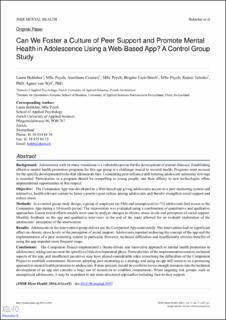Bitte benutzen Sie diese Kennung, um auf die Ressource zu verweisen:
https://doi.org/10.21256/zhaw-1756| Publikationstyp: | Beitrag in wissenschaftlicher Zeitschrift |
| Art der Begutachtung: | Peer review (Publikation) |
| Titel: | Can we forster a culture of peer support and promote mental health in adolescence using a web-based app? : a control group study |
| Autor/-in: | Wade-Bohleber, Laura Maria Crameri, Aureliano Eich-Stierli, Brigitte Telesko, Rainer von Wyl, Agnes |
| DOI: | 10.2196/mental.5597 10.21256/zhaw-1756 |
| Erschienen in: | JMIR Mental Health |
| Band(Heft): | 3 |
| Heft: | 3 |
| Erscheinungsdatum: | 2016 |
| Verlag / Hrsg. Institution: | JMIR Publications |
| ISSN: | 2368-7959 1438-8871 |
| Sprache: | Englisch |
| Schlagwörter: | Mental health; Health promotion; Mobile application; Adolescence; Peer group; Mentor |
| Fachgebiet (DDC): | 005: Computerprogrammierung, Programme und Daten 305: Personengruppen (Alter, Herkunft, Geschlecht, Einkommen) 616.89: Psychische Störungen, klinische Psychologie und Psychiatrie |
| Zusammenfassung: | Background: Adolescence with its many transitions is a vulnerable period for the development of mental illnesses. Establishing effective mental health promotion programs for this age group is a challenge crucial to societal health. Programs must account for the specific developmental tasks that adolescents face. Considering peer influence and fostering adolescent autonomy strivings is essential. Participation in a program should be compelling to young people, and their affinity to new technologies offers unprecedented opportunities in this respect. Objective: The Companion App was developed as a Web-based app giving adolescents access to a peer mentoring system and interactive, health-relevant content to foster a positive peer culture among adolescents and thereby strengthen social support and reduce stress. Methods: In a control group study design, a group of employed (n=546) and unemployed (n=73) adolescents had access to the Companion App during a 10-month period. The intervention was evaluated using a combination of quantitative and qualitative approaches. Linear mixed effects models were used to analyze changes in chronic stress levels and perception of social support. Monthly feedback on the app and qualitative interviews at the end of the study allowed for an in-depth exploration of the adolescents’ perception of the intervention. Results: Adolescents in the intervention group did not use the Companion App consistently. The intervention had no significant effect on chronic stress levels or the perception of social support. Adolescents reported endorsing the concept of the app and the implementation of a peer mentoring system in particular. However, technical difficulties and insufficiently obvious benefits of using the app impeded more frequent usage. Conclusions: The Companion Project implemented a theory-driven and innovative approach to mental health promotion in adolescence, taking into account the specifics of this developmental phase. Particularities of the implementation context, technical aspects of the app, and insufficient incentives may have played considerable roles concerning the difficulties of the Companion Project to establish commitment. However, adopting peer mentoring as a strategy and using an app still seems to us a promising approach in mental health promotion in adolescents. Future projects should be careful to invest enough resources into the technical development of an app and consider a large use of incentives to establish commitment. When targeting risk groups, such as unemployed adolescents, it may be expedient to use more structured approaches including face-to-face support. |
| URI: | https://digitalcollection.zhaw.ch/handle/11475/3367 |
| Volltext Version: | Publizierte Version |
| Lizenz (gemäss Verlagsvertrag): | CC BY 2.0: Namensnennung 2.0 Generic |
| Departement: | Angewandte Psychologie |
| Organisationseinheit: | Psychologisches Institut (PI) |
| Enthalten in den Sammlungen: | Publikationen Angewandte Psychologie |
Dateien zu dieser Ressource:
| Datei | Beschreibung | Größe | Format | |
|---|---|---|---|---|
| 2016_Bohleber_Culture of Peer Support.pdf | 1.36 MB | Adobe PDF |  Öffnen/Anzeigen |
Zur Langanzeige
Wade-Bohleber, L. M., Crameri, A., Eich-Stierli, B., Telesko, R., & von Wyl, A. (2016). Can we forster a culture of peer support and promote mental health in adolescence using a web-based app? : a control group study. JMIR Mental Health, 3(3). https://doi.org/10.2196/mental.5597
Wade-Bohleber, L.M. et al. (2016) ‘Can we forster a culture of peer support and promote mental health in adolescence using a web-based app? : a control group study’, JMIR Mental Health, 3(3). Available at: https://doi.org/10.2196/mental.5597.
L. M. Wade-Bohleber, A. Crameri, B. Eich-Stierli, R. Telesko, and A. von Wyl, “Can we forster a culture of peer support and promote mental health in adolescence using a web-based app? : a control group study,” JMIR Mental Health, vol. 3, no. 3, 2016, doi: 10.2196/mental.5597.
WADE-BOHLEBER, Laura Maria, Aureliano CRAMERI, Brigitte EICH-STIERLI, Rainer TELESKO und Agnes VON WYL, 2016. Can we forster a culture of peer support and promote mental health in adolescence using a web-based app? : a control group study. JMIR Mental Health. 2016. Bd. 3, Nr. 3. DOI 10.2196/mental.5597
Wade-Bohleber, Laura Maria, Aureliano Crameri, Brigitte Eich-Stierli, Rainer Telesko, and Agnes von Wyl. 2016. “Can We Forster a Culture of Peer Support and Promote Mental Health in Adolescence Using a Web-Based App? : A Control Group Study.” JMIR Mental Health 3 (3). https://doi.org/10.2196/mental.5597.
Wade-Bohleber, Laura Maria, et al. “Can We Forster a Culture of Peer Support and Promote Mental Health in Adolescence Using a Web-Based App? : A Control Group Study.” JMIR Mental Health, vol. 3, no. 3, 2016, https://doi.org/10.2196/mental.5597.
Alle Ressourcen in diesem Repository sind urheberrechtlich geschützt, soweit nicht anderweitig angezeigt.